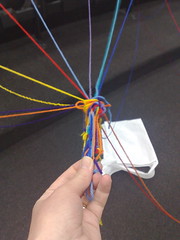 Per many Twitter requests…. Happy Thanksgiving (US holiday, but spirit is universal).
Per many Twitter requests…. Happy Thanksgiving (US holiday, but spirit is universal).
Pear & Cranberry Chutney – Recipe Circle | Google Groups
From: Gifts from the Kitchen, Williams Sonoma Kitchen Library
2 cups (14 oz/40g) firmly packed golden brown sugar
3/4 cu (3 oz/90g) dried cranberries
1/2 cup (4fl oz/125 mil) orange juice
1/2 cup (2 1/2 oz/75g) minced shallot (I’ve also used red onion)
3 tablespoons minced, peeled fresh ginger
2 tablespoons balsamic vinegar
1 tablespoon finely grated orange zest
1/2 teaspoon ground cinnamon (I’ve also improvised with other yummy spices like star anise)
3/8 teaspoon read pepper flakes
1/4 teaspoon salt
1 lob (500 g) pears, peeled, cored and cut into 1/2 inch dice
4 cups (1 lb/500g) fresh or frozen cranberries
In a heavy non aluminm saucepan over medium heat, combine the brown sugar, dried cranberries, orange juice, shallot, ginger, vinegar, orange juice, shallot, ginger, vinegar, orange zest, cinnamon, red pepper flakes and salt. Stir until the sugar dissolves. Add the pears and simmer, stirring occasionally, until the pears are tender, about 10 minutes.
Increase the heat to medium high. Add the fresh or frozen cranberries and boil, stirring frequently, until they begin to burst, about 5 minutes.
(the rest is canning directions — you don’t need that do you? I freeze whatever isn’t scarfed up. Much easier!)

